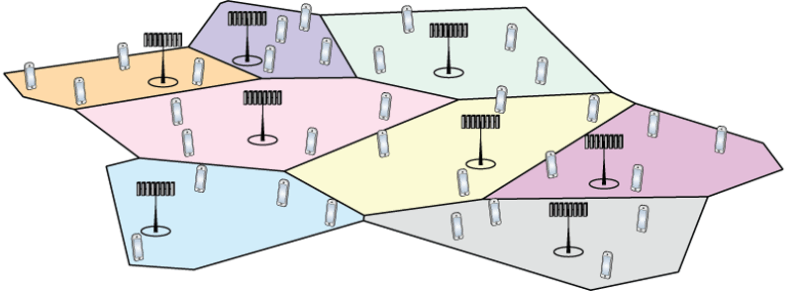- Basics of transmission methods, signal encoding, overview of wireless communication.
- Architecture for wireless LAN, PAN and BAN.
- Architecture of the cellphone networks of the current generation.
- Mobile applications, the things internet (IoT), and device-to-device communication (D2D).
- Sustainable development and tele-economy.
IK2560 Mobile Networks and Services 7.5 credits

This course teaches the basics of mobile networks, which are the backbone of our digitalized society. We start from the physical wireless transmissions and particularly consider signal design and encoding/decoding for error correction. We then cover the fundamental networking protocols and architectures for cellular networks as well as internet-of-things. Finally, we cover services and applications that the networks support, as well as business aspects related to successful network deployment. The physical transmissions are examined through a multiple-choice exam while the remaining aspects are explored more deeply in seminars and through project work.
Information per course offering
Choose semester and course offering to see current information and more about the course, such as course syllabus, study period, and application information.
Information for Autumn 2026 Start 26 Oct 2026 programme students
- Course location
KTH Campus
- Duration
- 26 Oct 2026 - 11 Jan 2027
- Periods
Autumn 2026: P2 (7.5 hp)
- Pace of study
50%
- Application code
10780
- Form of study
Normal Daytime
- Language of instruction
English
- Course memo
- Course memo is not published
- Number of places
Min: 1
- Target group
- Open to all programmes, as long as it can be included in your programme, mandatory for TCOMM
- Planned modular schedule
- [object Object]
- Schedule
- Schedule is not published
Contact
Course syllabus as PDF
Please note: all information from the Course syllabus is available on this page in an accessible format.
Course syllabus IK2560 (Autumn 2022–)Content and learning outcomes
Course contents
Intended learning outcomes
After passing the course, the student shall be able to
- explain basic functions in mobile networks and make performance calculations
- discuss the effect of the availability of affordable mobile services and the internet of things (IoT) in a global society
- explain the architecture of existing mobile and wireless networks and compare a network architecture with another
- describe the most important transmission methods, the network protocols and the applications in the cellphone networks of the current generation
- explain, in at sense, environment and sustainability challenges for the IKT sector, included electromagnetic radiation, energy consumption, limited natural resources, environment harmful effects, economic effects (both infrastructure and equipment) and economic and social societal effect
- show their knowledge of mobile networks and services both orally and in writing
- follow the current literature i.e. survey papers, conference contribution and periodical articles in the area.
Literature and preparations
Specific prerequisites
IK1203 Networks and communication or the equivalent.
Literature
Examination and completion
Grading scale
Examination
- PRO1 - Project, 3.5 credits, grading scale: A, B, C, D, E, FX, F
- TEN1 - On-campus digital assessment, 4.0 credits, grading scale: P, F
Based on recommendation from KTH’s coordinator for disabilities, the examiner will decide how to adapt an examination for students with documented disability.
The examiner may apply another examination format when re-examining individual students.
If the course is discontinued, students may request to be examined during the following two academic years.
Examiner
Ethical approach
- All members of a group are responsible for the group's work.
- In any assessment, every student shall honestly disclose any help received and sources used.
- In an oral assessment, every student shall be able to present and answer questions about the entire assignment and solution.
Further information
Course room in Canvas
Offered by
Main field of study
Education cycle
Supplementary information
In this course, the EECS code of honor applies, see: http://www.kth.se/en/eecs/utbildning/hederskodex.